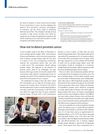 9 citations,
October 2013 in “PLOS ONE”
9 citations,
October 2013 in “PLOS ONE” Dutasteride works better than finasteride for preventing and treating prostate cancer.
 May 2011 in “Expert Review of Endocrinology & Metabolism”
May 2011 in “Expert Review of Endocrinology & Metabolism” Breast cancer survivors may have a higher risk of falls, tamoxifen could prevent breast cancer and deaths, new guidelines urge caution with prostate cancer therapy, and early balding in men may indicate a higher prostate cancer risk.
7 citations,
August 2006 in “Maturitas” Cimicifuga racemosa extract may help prevent and treat prostate issues by inhibiting 5α-reductase.
 108 citations,
February 2008 in “The Journal of urology/The journal of urology”
108 citations,
February 2008 in “The Journal of urology/The journal of urology” Inhibiting 5α-reductase can help reduce prostate cancer risk and improve treatment.
 10 citations,
June 2010 in “Expert Opinion on Drug Metabolism & Toxicology”
10 citations,
June 2010 in “Expert Opinion on Drug Metabolism & Toxicology” Finasteride reduces prostate cancer risk but may increase high-grade cancer chances.
 February 2012 in “Community oncology”
February 2012 in “Community oncology” Finasteride for hair loss may increase the risk of certain cancers and has side effects; better regulation and education on its use are needed.
 April 2024 in “Prostate international”
April 2024 in “Prostate international” Male pattern baldness does not cause an increased risk of prostate cancer.
 7 citations,
October 2017 in “The Prostate”
7 citations,
October 2017 in “The Prostate” Baldness in men with prostate cancer is linked to higher levels of certain sex hormones, but chest hair density is not.
 1 citations,
August 2013 in “Journal of the National Cancer Institute”
1 citations,
August 2013 in “Journal of the National Cancer Institute” Early hair loss may increase the risk of prostate cancer, especially in African American men and those with frontal baldness.
 November 2005 in “The Journal of Urology”
November 2005 in “The Journal of Urology” Dutasteride may lower the chance of finding prostate cancer in men with enlarged prostates.
 218 citations,
December 2011 in “Advances in Urology”
218 citations,
December 2011 in “Advances in Urology” The document concludes that the 5 alpha-reductase enzymes are important in steroid metabolism and related to various human diseases, with inhibitors used to treat conditions like male pattern baldness and prostate issues.
 1 citations,
August 2021 in “Preventive Medicine”
1 citations,
August 2021 in “Preventive Medicine” Not taking prescribed medications properly can lead to higher death rates from unrelated health conditions.
 32 citations,
May 2006 in “The Journal of Urology”
32 citations,
May 2006 in “The Journal of Urology” Using finasteride with TIP extends time off period for prostate cancer patients.
 June 2007 in “Nature Clinical Practice Urology”
June 2007 in “Nature Clinical Practice Urology” Finasteride for hair loss lowers PSA levels, so PSA values need adjusting when screening for prostate cancer.
 August 2012 in “Expert Review of Dermatology”
August 2012 in “Expert Review of Dermatology” Men with early hair loss may have a higher risk of enlarged prostate and possibly prostate cancer due to shared hormonal factors.
1 citations,
January 2018 in “Advances in cancer prevention” Preventing cancer involves lifestyle changes, vaccinations, early screening, and understanding cancer's molecular basis.
50 citations,
April 2010 in “Biology direct” Low androgen levels might delay prostate cancer but could lead to more aggressive, therapy-resistant cancers.
 4 citations,
November 2005 in “The Journal of Urology”
4 citations,
November 2005 in “The Journal of Urology” Large prostates link to more hair loss.
 20 citations,
March 2005 in “Current Medicinal Chemistry”
20 citations,
March 2005 in “Current Medicinal Chemistry” New compounds show promise for treating hair loss, enlarged prostate, and prostate cancer, with some being more effective and having different side effects than current treatments.
 February 2007 in “Lancet Oncology”
February 2007 in “Lancet Oncology” Using a single PSA level to decide on a prostate biopsy is not effective; a more personalized approach considering various factors is recommended.
 28 citations,
June 2010 in “European Journal of Cancer”
28 citations,
June 2010 in “European Journal of Cancer” Baldness at age 40 is not linked to a higher risk of aggressive prostate cancer.
January 2021 in “HAMDAN MEDICAL JOURNAL” Finasteride treats hair loss and reduces prostate cancer risk.
 20 citations,
May 2011 in “Cancer Biology & Therapy”
20 citations,
May 2011 in “Cancer Biology & Therapy” Finasteride may improve prostate cancer treatment outcomes.
 3 citations,
March 2005 in “The Journal of urology/The journal of urology”
3 citations,
March 2005 in “The Journal of urology/The journal of urology” Dutasteride may help shrink prostate cancer tumors.
April 2005 in “The Journal of urology/The journal of urology” Dutasteride may help treat prostate cancer by causing cancer cells to shrink and die.
 25 citations,
December 2008 in “The Journal of Urology”
25 citations,
December 2008 in “The Journal of Urology” Short-term finasteride treatment may lower some cell death factors in prostate cancer cells.
 January 2023 in “International Journal of Clinical and Medical Education Research”
January 2023 in “International Journal of Clinical and Medical Education Research” Correct testosterone levels for age to treat prostate cancer, using low dose treatments as necessary.
 4 citations,
October 2002 in “BJUI”
4 citations,
October 2002 in “BJUI” Finasteride treats hair loss but may affect prostate cancer detection.
 75 citations,
January 2014 in “Korean Journal of Urology”
75 citations,
January 2014 in “Korean Journal of Urology” 5α-reductase inhibitors can cause sexual problems, higher risk of aggressive prostate cancer, and depression.
 33 citations,
January 2016 in “Indian Journal of Dermatology, Venereology and Leprology”
33 citations,
January 2016 in “Indian Journal of Dermatology, Venereology and Leprology” Taking 1 mg of finasteride daily can increase hair count and improve hair appearance, but it may have side effects on sexual function and a potential risk of prostate cancer. It may not be effective for postmenopausal women unless taken in higher doses.

























